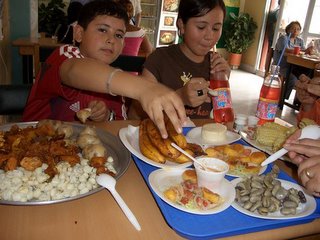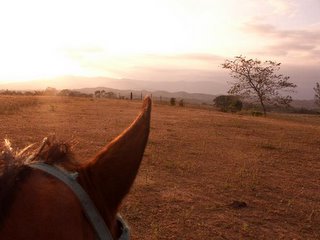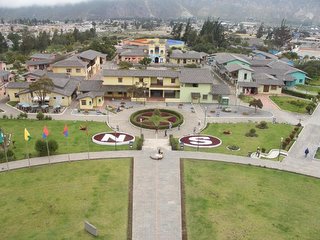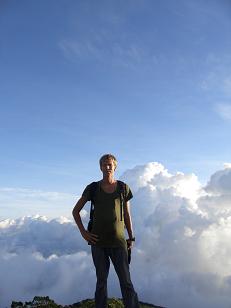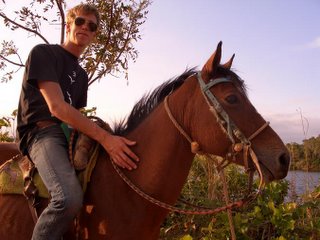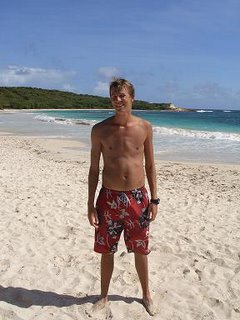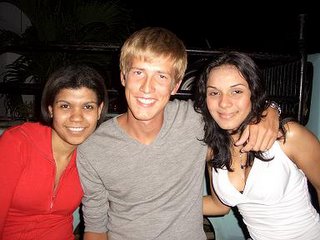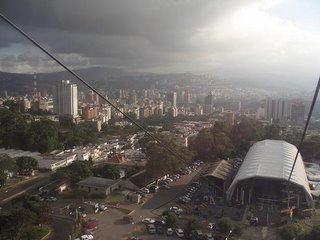I was leaving a country that I had almost fallen in Love in. Venezuela was the first smell of South America I had. I had experienced the bad side of Caracas, and I had taken the cable car to the top of the mountain surrounding Caracas. I had seen the whole city, and I had felt the Life there – even though Chavez is in power.
I had been to the countryside, off the beaten track. I had been living with a family, ate the local food, seen the beautiful girls, taken showers under a waterfall, been dancing and tipsy with 10 other young people from the town of Barquisimeto. I had felt the hospitality of the people, and the look at the girls when they saw a tall blond man. I had experienced the strong catholic connections, that whole of South America has. The word had been spread to me, in English and in Spanish. All this, in such a short time – and now I was going to leave it. I was going on a busride from a little tiny village outside Barquisimeto, through the notorious Columbia to my next destination; Ecuador and Quito.
The bus I was going with was not much different from a bus, which I would be taking if I wanted to go to Copenhagen, or to the college in Norway. I must admit that I got a bit scared about the thought of driving for 48 hours in that bus, not speaking Spanish, being 40 centimeters taller than most South Americans, and therefore the seats were also 40 cm. too small for me.
I was sitting and enjoying my “Manitobe”, some Venezuela candy, when suddenly the bus stops. It is only 22.00, and I know that we shouldn’t stop before the Columbian border. It is the police; it is one of these policecontrols that I got to experienced so many times on my tour. One of the policemen goes in and look around, “aha, a gringo” he thinks. He asks me in Spanish to get out of the bus. First he body searches me, and then he asks for my passport. I felt that he was just like the lady I met in Antigua, who just wanted money. I showed him my copy of my passport, but he didn’t seem fully satisfied. He asks me some questions, from where I only understood two of them. Was I carrying any alcohol? No, of course not… Did I have a vaccination card? Yes, of course… He got a bit disappointed when I showed him my yellow vaccination card; with all kinds of strange names in (I got so many things in my body before the Sahara that I almost felt like a heroin addict). He doesn’t understand a word of English or French, so he just looks on every page, pretending that he knows what it said. Finally, he let me go. He continue asking me questions, but it seems that I little word fight was won by me, with the great answer to every of his questions. Habler Usted Engles?.... The bus driver smiles, clap me on the shoulder when I enter the bus, he knows that I for a moment was a bit scared. It was also here that I learned that a smile is the best way to communicate between two people, who doesn’t share a common language.
I was so tired when we arrived at a highway restaurant at 01.00, still in Venezuela. I was standing there in my trance, eating my little sandwich and looking at a 7-8 years old boy who is washing our bus, it seems like he wants to do his best, and he uses all the energy that small kids have, he is working hard, I am seeing the world…He takes the sweat off his forehead, I eat my sandwich…a cockroach climbs over my shoe, trying to get some of the small pieces of food that I drop. I am thinking that this is too loca, half of the passengers in the bus looks like drug dealers. We go into the buss again, and drive towards the border.
At 02.00 one of the two passengers in front of me screams up, I understand that he wants the light to be turned on in the bus, but why? I realized it when I look at the passenger right in front of me; he is shaking all over the body. It looks like the attacks that people with diabetes sometimes gets, but no one does anything. I am trying to hold his head, so he doesn’t smash it into the floor. The passenger next to me tells me that he has epilexia. At 04.00 we cross the border to Columbia. In my bible (my guidebook), it says that I shouldn’t be in Cucuta too long, so I am glad when we finally sit in the bus again.
I woke up to a wonderful sight, Columbia seems a lot more green and fertile than the northern of Venezuela. The mountains here are also bigger, much bigger. I was driving in the Andes; luckily I couldn’t feel any altitude sickness, even though I was driving high. The mountains I had seen in Norway was small traffic bumps compare to what I saw now, Norway suddenly seemed so little in my head. The areas we drove by seemed very poor, but people were smiling everywhere. Money is for sure not happiness. I think that the poverty I saw in Columbia, was the reason why I didn’t feel particularly sad when I discovered that my new camera was broken. This camera had been with me to the Middle East, Greenland, the Sahara, across the Atlantic – and now it gave up. Saltwater, sand and ice was what it could take, but not altitude. I know that I wouldn’t be able to take picture of the things I saw as well, because I need a camera which could catch an atmosphere, a smell, and a sound. I saw all these people without the “western necessities”, so why did I need a camera, when I had my two eyes?
The Andes Mountains are big, and steep. The roads were small, and the bus driver drove fast. Everyone was speaking Spanish to me in the bus, we were only five hours from Bogotá, and I was backpacking – I was living.
I had seen that two girls onboard were very nervous every time the police stopped us, and one of them was hiding on the toilet all the time. I had seen so many movies, that I immediately realized that they were carrying drugs. However, I started to talk with them, and realized that one of the girls had just forgotten her passport; and they were actually really nice girls. They gave me food, and offered to change my dollars to pesos, and they even gave me a better exchange rate than the once I read about in my guidebook, I tried to pay them, but they didn’t want money. One of the girls just wanted to practice her English.
We got stopped one more time by the police, this time the Columbian, they took everyone out and searched the bus. The policemen were heavily armed, and not much older than me. Small kids, trying to be strong. After 30 min. without any results, one of the policemen came in and said a lot in Spanish. I only understood that we should be grateful that the Columbian police are protecting us against FARC and other evils. The whole bus ended the speech with a loud: GRACIAS! – like amen in the church.
I only saw Columbia’s capital in the night, and it the dark it looked like every other big city in the world, I was everywhere, and nowhere. In the night, we are all strangers, even to ourselves. Everything is covered in this blurred blanket, and I never really felt anything in Bogotá.
I closed my eyes, ate one more of the chocolate cookies that Pedros mom had bought me, the taste, the smell, and the feeling of eating them reminded me of the many times that I have been driving through Denmark with my friend, Martin, with cookies in our mouth and Shu-bi-dua in our ears, towards a new destination. Foods always dig up my deepest memories, traveling as well. I remember my childhood a lot more when I travel; I guess my childhood was one long travel of new experiences. As Seneca said, let no one else conquer you, than your soul.
It was in Cali, 24 hours away from Ecuador that I realized that the bus was going to be delayed, much delayed. I guess, I have to get use to the infrastructure in the country, and the police…
Columbia was a dinosaur land for me, green and fertile, and every corner had a new surprise – and there were many corners, up and down the mountains. Sometimes I felt that I was in Greenland again, I could sense how the ice had created these mountains, I could see the same as I saw in Greenland, how strong nature was. I also saw churches everywhere, just like Cape Verde. I think it is a bit sad, that the Spanish conquistadors managed to make such a strong influence on the native population. Religion is culture, and I feel that the Incas lost a lot of the cultures, when they were forced to be Christians.
It was five hours away from the border that I met three English speaking people. The first one who came and talked with me was a man from Mexico, studying agriculture in Brazil, had a Columbian girlfriend and had been studying in the USA for eight years. The second one was a lot quieter. He was from Columbia and was going to Peru to see Machu Picchu, because he was studying history at the university in Bogotá. The last one was a girl, she was going to Peru as well to be together with other Hare Krishna followers like herself. I learned a lot from these three people, I learned about politics, culture, and music in south America. I discussed “One hundred Years of Solitude”, Borges, Pablo Neruda, Sin Documentos, and everything else that I knew from South America. I even taught two of them about the mate from Argentina and Uruguay. We were waiting for 5 hours at the border before it opened, I got to taste the Columbia coffee, and I got to taste the South American mentality. It seems like the talk a lot more with each other. They talk a more with strangers, a lot more than Danes. I think it is because of the shared language that they have, and the long distance they have to travel. They also have the same culture of revolutions and coups, and it seems like politics is the favorite topic of conversation.
I met another Dane at the border to Ecuador; she was studying social-anthropology in Norway, and had now been backpacking from Brazil to Columbia. She was one of these people who wouldn’t like to be called a tourist, but preferred “traveler”. I could feel that she was really disappointed to meet another Dane at this time, at this place. Sorry lady, you are not the only one.
The trip through Ecuador was long, especially because of the police who wanted all the luggage out, and started to cut with knives in some of it. We also had to wait for 2 hours in a little town, because of a protest. Burning tires and cars in a protest seemed like everyday life, for most of the people in the bus.
It was a strange feeling to arrive to Quito after 74 hours of driving, the city is not built on the top of the mountain, or in a valley, no, it is built everywhere on the mountains around it. It was almost fully covered in clouds when I arrived, which I later realized was pollution. To see the town was a special feeling, you drive and drive and drive, and then suddenly it is there. In the middle of nowhere is the capital of Ecuador.
My first sight with the stereotypes from the guidebooks happened three hours outside Quito. I didn’t believe that “they” existed in real life, but then suddenly; on page 371 in my book, at 16.07, I looked out of the window and then I saw her. Right next to a three meter high stature of a superman look-alike with a hammer, just like Soviet art, there she was, little, old, with a destroyed bag, and the classic black round hat, and of course the poncho. She was carrying food, and did not look at me. I only saw her for two seconds before the bus turned around a corner; but I could feel it now. WELCOME TO SOUTH AMERICA!


